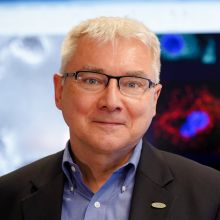Suggestions
Pawel Kalinski
Senior Vice President for Team Science; Chair, Department of Immunology; Roswell Park Comprehensive Cancer Center
Pawel Kalinski is a prominent figure in the field of cancer immunotherapy, currently serving as the Senior Vice President for Team Science at Roswell Park Comprehensive Cancer Center. He also holds the position of Chair of the Department of Immunology and is recognized as the Jacobs Family Endowed Chair of Immunology.
Educational Background
- MD from Warsaw Medical Academy, Poland (1991)
- PhD in Immunology from the University of Amsterdam, The Netherlands (1998)
- Completed a residency in Medicine at the Central Clinical Hospital of the Military Medical Academy in Warsaw, Poland (1994)
- Undertook fellowships in Immunology at the University of Amsterdam (2000) and participated in a research fellowship there in 1992.
Research Focus
Kalinski's research primarily revolves around:
- The biology of dendritic cells and their use in vaccines.
- T cell targeting therapies for cancer.
- The role of natural killer cells and myeloid-derived suppressor cells in tumor immunity.
- Developing new methods to enhance immune responses against tumors while minimizing regulatory T cell and suppressor cell activity.
His work aims to integrate immunotherapy with traditional cancer treatments such as surgery, chemotherapy, and radiotherapy. He leads various interdisciplinary projects funded by NIH, DOD, and pharmaceutical companies, focusing on cancers including melanoma, colon cancer, prostate cancer, and hematologic malignancies.
Professional Affiliations
Kalinski is a member of several prestigious organizations:
- American Society of Clinical Investigation (2015)
- American Association for Cancer Research (2011)
- Society for Clinical and Translational Science (2009)
- Society for Immunotherapy of Cancer (2008)
- Society for Natural Immunity (2004)
- American Association of Immunologists (2001)
Kalinski has made significant contributions to the field through clinical trials and research aimed at improving cancer therapies by leveraging the immune system's capabilities.

